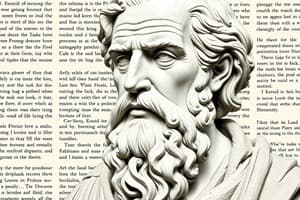Podcast
Questions and Answers
What is the primary objective of literature according to Matthew Arnold?
What is the primary objective of literature according to Matthew Arnold?
- To provide entertainment
- To promote moral and spiritual inspiration (correct)
- To develop critical thinking
- To analyze social issues
What is the key characteristic of literature according to Matthew Arnold?
What is the key characteristic of literature according to Matthew Arnold?
- Originality
- Creativity
- High truth and high seriousness (correct)
- Imagination
What is the main focus of Moral-Philosophical Criticism?
What is the main focus of Moral-Philosophical Criticism?
- To determine the worth of the literature by seeing if it encourages good out of the reader (correct)
- To analyze the literary style of the author
- To evaluate the historical context of the literature
- To identify the themes and motifs in the literature
What is the moral lesson that can be derived from the story of The Tortoise and the Hare?
What is the moral lesson that can be derived from the story of The Tortoise and the Hare?
What is the common thread among the views of Horace, Samuel Johnson, and Matthew Arnold?
What is the common thread among the views of Horace, Samuel Johnson, and Matthew Arnold?
What is the characteristic that the Hare lacked in the story of The Tortoise and the Hare?
What is the characteristic that the Hare lacked in the story of The Tortoise and the Hare?
What is the primary focus of the moral-philosophical approach to literary criticism?
What is the primary focus of the moral-philosophical approach to literary criticism?
What is the core idea behind Plato's theory on literature and morality?
What is the core idea behind Plato's theory on literature and morality?
What is the main goal of Christian Humanism in literary criticism?
What is the main goal of Christian Humanism in literary criticism?
What is the name of the literary criticism approach that emerged as a response to Naturalism and Romanticism?
What is the name of the literary criticism approach that emerged as a response to Naturalism and Romanticism?
What is the primary belief of moral-philosophical critics regarding the purpose of literature?
What is the primary belief of moral-philosophical critics regarding the purpose of literature?
What is the significance of Aristotle's theory in the context of moral-philosophical criticism?
What is the significance of Aristotle's theory in the context of moral-philosophical criticism?
Flashcards are hidden until you start studying
Study Notes
Definition and Background
- Moral-Philosophical approach to literary criticism originates from the Latin word "moralis", meaning "proper behavior of a person in society".
- This approach evaluates literature based on its ethical merits and believes that literature should instruct morality.
History of Moral-Philosophical Criticism
- Began around 360 B.C.
- Ethically sound literature that encourages virtue is praised, while literature that misguides or corrupts is condemned.
Evolution of Moral-Philosophical Criticism
- Moral Criticism
- Post-modern Moral Criticism (Neo-Humanist): evaluates morality based on the reader's response, a response to Naturalism and Romanticism.
- Christian Humanism: replaced Neo-Humanism after WWII, using Christian beliefs and teachings of morality as its basis.
Proponents and Their Theories
- Plato: acknowledged literature's power as a teacher, believing it capable of corrupting morals and undermining religion (Moralism).
- Aristotle: considered literature capable of fostering virtue.
- Horace: believed literature should be "delightful and instructive", studying how poetry can promote morality in his Ars Poetica.
- Samuel Johnson: believed the function of literature is to teach morality and probe philosophical issues.
- Matthew Arnold: believed poetry's most important offering is its moral/philosophical teaching, a source of moral and spiritual inspiration.
Sample Analysis: The Tortoise and the Hare
- A fable demonstrating the moral value of perseverance and humility over arrogance and overconfidence.
Things to Consider for Moral-Philosophical Criticism
- Evaluate literature based on its ability to encourage good in the reader, considering aspects such as:
- Maturity
- Sincerity
- Honesty
- Sensitivity
- Courage
Studying That Suits You
Use AI to generate personalized quizzes and flashcards to suit your learning preferences.




